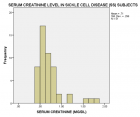About Ladoke Akintola University of Technology
Ladoke Akintola University of Technology
Articles by Ladoke Akintola University of Technology
Burden of hearing loss in Subsaharan Africa: Snapshot from an ENT clinic in Nigeria
Published on: 31st December, 2019
OCLC Number/Unique Identifier: 8512989994
Background: Disabling hearing loss is a prevalent public health issue, with significant impact on patients’ communication. The disability associated with hearing loss depends on the severity of the hearing loss. There are limited rehabilitative measures in resource challenged environment. This study assesses the incidence, the factors for hearing impairment and the management outcome.
Methods: A descriptive three-year chart review of patients managed for hearing loss in a tertiary health center in a developing country. The data collected include demographic data, clinical presentation and risk factors for hearing loss, audiometric reports, rehabilitative measures and management outcome.
Results: The patients with ear symptoms managed within the study period were 1350, of whom 498 (36.8%) had hearing loss of varying degrees. These included 145 (29.1%) males and 353 (70.9%) females with male to female ratio of 1:2.4. The age ranged from 8 to 80 years (median age of 35.7). Disabling hearing loss in the better-hearing ear occurred in 216 (43.4%) of cases. Increasing age and chronic supportive otitis media were associated with disabling hearing loss. The hearing thresholds improved with hearing aids and ear surgical procedures; nonetheless the patients’ rehabilitation was impaired by limited resources.
Conclusion: There is poor rehabilitation of people with hearing loss, though management outcome is commendable in a few of them. Health education will reduce the risk factors for disabling hearing loss and improved rehabilitative measures are needed for these individuals.
Rida Herbal Bitters Improve Cardiovascular Function in High-fat Diet/Streptozotocin-induced Diabetic Rats
Published on: 28th February, 2024
Background: Effective medication to manage diabetes mellitus-related organ complications with minimal adverse drug toxicity is still in pursuit by scientists worldwide. This study investigated the cardio-protective of Rida herbal bitter (RHB) in a high-fat diet/streptozotocin (STZ)-induced diabetic rats.Methods: Thirty-two matured male Wistar rats (250 ± 20g) were used. The animals were fed with high-fat diet (HFD) for 6 weeks before diabetes induction. A single dose of (35 mg/kgb.wt) freshly prepared STZ was injected intraperitoneally to induce diabetes. The animals were allocated into four groups, 8rats/group. Group I: control; Group II: HFD/STZ-induced diabetic rats; Groups III & IV: HFD/STZ-induced diabetic rats treated with 0.3 ml RHB & 200 mg/kgb.wt metformin respectively. At the end of the experiment, the animals were sacrificed, blood was sample collected via cardiac puncture and the heart was excised and homogenized. The blood samples and cardiac homogenates tissue were centrifuged to retrieve clear supernatant plasma for biochemical assay.Results: Diabetic rats exhibited significant (p < 0.05) elevated blood glucose, insulin, glycated hemoglobin (HbA1c), cardiac biomarkers, lipid profile, malondialdehyde (MDA), pro-inflammatory cytokines, food, and water intake levels with a reduction in body weight, cardiac antioxidant activity, and total protein. RHB administration significantly (p < 0.05) diminished the blood glucose, insulin, HbA1c, cardiac biomarkers, MDA, pro-inflammatory cytokines, lipid profile, food, and water intake, and improved the body weight cardiac antioxidant activity, and total protein.Conclusion: Rida herbal bitter possesses a cardio-protective effect from this study and could be a better alternative medication for managing diabetes and its related cardiovascular complications.
GS-MS Profile, Total Flavonoid and Phenolic Contents and Antioxidant Capacity of Leaves of Vitelleria paradoxa c.f. Gaertn
Published on: 1st May, 2024
Vitellaria paradoxa is an important medicinal plant that is used for the treatment of infections such as diarrhea, dysentery, helminthes, gastrointestinal tract, skin, and wounds. This research aims to determine other important uses of the plant leaves and quantify the phytochemicals present in the leaves. The plant leaves were extracted with two solvents (n-hexane and methanol). The phytochemicals were qualitatively and quantitatively analyzed using standard methods. The antioxidant activity was determined using DPPH. In the qualitative phytochemical screening of the methanol extract flavonoids, alkaloids, saponins, and tannins were identified as being present while steroids, anthraquinones, and glycosides were absent. All the screened secondary metabolites were absent in the n-hexane extract. In the GC-MS analysis of the methanol and n-hexane extracts seven compounds were obtained from the methanol extract while a total of twenty-four compounds were obtained from the n-hexane extract. The quantitative determination of the total flavonoid and phenolic contents showed that the leaves high content of flavonoids (91.00 mg quercetin equivalent/g extract) and phenolics (91.39 mg Gallic acid equivalent /g extract). These phytochemicals could be responsible for its high antioxidant activity (79.62%).
Cardioprotective Potentials of Anacardium occidentale Nuts Methanolic Extract in Diabetes-Induced Cardiac Dysfunction in Rats
Published on: 15th May, 2024
Background: The unwanted adverse toxicity displayed by synthetic antidiabetic medicine leads to the search for effective natural medicine to combat diabetes complications. This study investigated the cardioprotective of Anacardium occidentale nuts methanolic in high-fat diet (HFD)/streptozotocin (STZ)-induced diabetic rats.Materials and methods: Forty male adult Wistar were used and fed with HFD for 6 weeks before diabetes induction. The rats were grouped into 5 groups, 8 rats/group. Group I: normal control; Group II: diabetic control; Group III & IV: diabetic rats + 100 mg/kgb.wt & 200 mg/kgb.wt Anacardium occidentale nuts methanolic extract; Group V: diabetic rats + 200 mg/kgb.wt metformin. The rats were sacrificed on the experiment’s last day, blood samples were collected and the hearts were isolated for biochemical parameters estimation.Results: Food intake, water intake, plasmas insulin, Fasting Blood Glucose (FBG), glycosylated hemoglobin (HbA1c), cardiac enzymes, lipid profile, inflammatory cytokines, malondialdehyde, fibrotic marker, caspase-3 in cardiac of diabetic rats were elevated (p < 0.05) significantly. Body weight, cardiac antioxidant, and anti-apoptotic marker levels diminished (p < 0.05) significantly in diabetic rats. 100 mg/kgb.wt & 200 mg/kgb.wt of Anacardium occidentale nuts methanolic extract administration significantly suppressed the plasma insulin, FBG, HbA1c, cardiac lipid profile, cardiac enzymes biomarker, cardiac inflammatory cytokines, cardiac malondialdehyde, cardiac fibrotic marker, cardiac caspase-3, food intake & water intake and increased the body weight, cardiac antioxidant & cardiac anti-apoptotic marker in the diabetic rats.Conclusion: Anacardium occidentale nuts attenuate cardiac injury in diabetes. It could be a natural medicine to manage diabetes-cardiovascular complications.
Linagliptin Efficacy on Hyperglycemia, Oxidative Stress, and Inflammation in Gestational Diabetes Mellitus
Published on: 29th August, 2024
Background: Linagliptin is an anti-diabetic drug that claims no adverse effects and treatment of gestational diabetes mellitus (GDM) demands a safe anti-diabetic medication. Therefore, this study investigates the anti-diabetic efficacy of linagliptin in an induced GDM.Materials and methods: Thirty-two matured female rats (100 - 200 g) were utilized. Sixteen non-pregnant/diabetic animals were fed with a normal diet and sixteen rats were fed with a high-fat (HFD), mated at the estrous stage in 2:1, and pregnancy was confirmed with a spermatozoa in a vaginal smear. The pregnant rats were intraperitoneally injected with a single dose (30 mg/kgb. wt)of streptozotocin (STZ) to induce GDM. The animals were grouped into 4 groups, 8 rats/groups. Group I: control; Group II: control + 10 mg/kgb.wt linagliptin; Group III: GDM; Group IV: GDM + 10 mg/kgb.wt linagliptin. The animals were sacrificed after 14 days of treatment. Blood samples were collected for biochemical parameters.Results: Fasting blood glucose (FBG) insulin, glycated hemoglobin (HbA1c), total cholesterol (TC), triglyceride (TG), low-density lipoprotein-cholesterol (LDL-C), malondialdehyde (MDA), interleukin-6 (IL-6), interleukin-1β (IL-1β), and tumor necrosis factor-alpha (TNF-α) levels significant (p < 0.05) elevated in GDM rats, with significant reduction in high-density lipoprotein-cholesterol (HDL-C), catalase (CAT), superoxide dismutase (SOD) and reduced glutathione (GSH). Linagliptin administration significantly (p < 0.05) decreased the FBG, insulin, HbA1c, TC, TG, LDL-C, MDA, IL-6, IL-1β, and TNF-α and ameliorates the HDL-C, CAT, SOD, and GSH levels significantly.Conclusion: Linagliptin remarkably showed anti-hyperglycemic, anti-oxidative, and anti-inflammatory properties. Linagliptin could be a promising drug for hyperglycemia treatment during gestation.
Adult Neurogenesis: A Review of Current Perspectives and Implications for Neuroscience Research
Published on: 12th November, 2024
Background: The study of new neuron formation in the adult brain has sparked controversy and ignited interest among scientists in recent times, these include its occurrence and location in the adult human brain, functional significance, variation in study methods, translation from animal model to human, and ethical challenges involving neural stem cell research. Aim: To provide a comprehensive understanding of adult neurogenesis, functional significance, and challenges and explore the latest advances in the study of adult neurogenesis. Methodology: An extensive and systematic search of electronic databases (Medline, Scopus, Web of Science) was conducted using keywords related to adult neurogenesis and techniques involved in its study. Results: The mechanism of adult neurogenesis was found to occur in specific brain regions such as the subgranular zone of the dentate gyrus and subventricular zone of the lateral ventricle. Adult neurogenesis is vital neural plasticity, providing a potential mechanism for the brain to adapt and reorganize in response to environmental cues and experiences. Cutting-edge research and sophisticated imaging techniques, such as two-photon microscopy, MRI, optogenetic, and stem-cell-based therapies have provided deeper insight into the study of adult neurogenesis. Conclusion: The study of neurogenesis is important for understanding nervous system development, physiology, pathology, and exploring neuroplasticity. Its advancement is challenged by some ethical concerns regarding embryonic, pluripotent stem cells, and the need for safe, and noninvasive study methods. Although recent breakthroughs in neuroimaging, microscopic techniques, and genetic tools are aiding real-time study of adult neurogenesis.
The Synergistic Effect of Combined Linagliptin and Metformin Improves Hepatic Function in High-fat Diet/Streptozotocin-induced Diabetic Rats
Published on: 2nd June, 2025
Background: Monotherapy for liver dysfunction in diabetes is less effective. This study investigated the effect of combined linagliptin and metformin therapy on liver function in diabetic rats. Methods and materials: Sixty-four mature male (200-300 g) Wistar rats were used. Streptozotocin (35 mg/kgb.wt) was repeatedly injected intraperitoneally to induce diabetes. The rats were grouped into eight groups (n = 8). Group I: control; Group II: control + 10 mg/kgb.wt linagliptin; Group III: control + 200 mg/kgb.wt metformin; Group IV; control + 10 mg/kgb.wt linagliptin + 200 mg/kgb.wt metformin; Group V: diabetic; Group VI: diabetic + 10 mg/kgb.wt linagliptin; Group VII: diabetic + 200 mg/kgb.wt metformin; Group VIII: diabetic + 10 mg/kgb.wt linagliptin + 200 mg/kgb.wt metformin. The animals were sacrificed on the last day of the experiment, blood and liver samples were collected for biochemical assay. Results: Insulin, blood glucose, glycated hemoglobin, total cholesterol, triglycerides, low-density lipoprotein cholesterol (LDL-cholesterol), liver function biomarkers, liver glucose metabolic enzymes, malondialdehyde and inflammatory markers increased (p < 0.05) significantly. High-density lipoprotein-cholesterol (HDL-cholesterol), liver antioxidant, glycogen, and glycogen synthase were reduced significantly in diabetic rats. Linagliptin and metformin administration single and combined reduced the insulin, blood glucose, glycated hemoglobin, total cholesterol, triglycerides, LDL-cholesterol, liver function biomarkers, liver glucose metabolic enzymes, malondialdehyde, and inflammatory markers, and increased the HDL-cholesterol, liver antioxidant, glycogen and glycogen synthase in diabetic rats.Conclusion: Linagliptin monotherapy alone efficiently controls hyperglycemia and remarkably improves liver functions. Combining linagliptin and metformin could be used as safe and effective therapy for liver dysfunction progression in diabetes.

HSPI: We're glad you're here. Please click "create a new Query" if you are a new visitor to our website and need further information from us.
If you are already a member of our network and need to keep track of any developments regarding a question you have already submitted, click "take me to my Query."

















































































































































